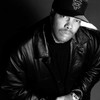An convention-goer inspects an assault rifle on display at the 2004 annual convention of the National Rifle Association in Pittsburgh, Pennsylvania. Photo by Jeff Swensen/Getty Images
This is not an article about gun control. It's not another rehashing of the tired, conventional arguments over why America has the highest rates of gun violence in the developed world, or whether universal background checks and new assault weapons would solve the problem, or if the Second Amendment entitles private citizens to buy whatever firearms they feel like owning. No, this is an article about money—about how Americans are collectively being played like fools, our respective fears exploited by those who profit from perpetual bloodshed.As a hip-hop artist and activist from the San Francisco Bay Area, I've seen my fair share of gun violence, and its devastating effects. I'm also a gun owner with a degree in economics. I say that to preemptively rebuff those who would instinctively tell entertainers with opinions to "shut up and sing" when those opinions differ from their own, or who casually dismiss opposing political views as uninformed or partisan. The whole "us vs. them" dynamic is inconsequential anyway—people are dying, and commentary about our broken political system is best saved for another day.As most of you have probably realized—and as this week's congressional inactivity confirmed—the fight over gun control in the United States is not one that rational voices on either side can win. Like so much in American politics, the debate is governed by emotions. And when it comes to guns, those emotions are usually (perhaps exclusively) anger and fear—of minorities and Muslims; of violent crime, of ISIS or any other bogeyman du jour; of a "weapons culture" liberals disagree with; and of the politicians who conservatives claim are "coming for our guns."Incidentally, fear and anger also generate a lot of revenue—upwards of $16 billion, in fact, for guns and ammunitions manufacturers in 2015 alone. That was a big year for gun sales, with the FBI recording 23 million background checks, the highest number ever—although it looks like the US may break that record in 2016. Gun manufacturing has similarly ballooned, with US firearms makers producing nearly 11 million guns, according to the most recent data from the Bureau of Alcohol, Tobacco and Firearms.With numbers like these, there is zero financial incentive for gun retailers, gun companies and their paid-for political lackeys to take any meaningful steps to curtail gun violence. On the contrary, the gun industry tends to benefit handsomely from high-profile mass shootings, as anxieties over personal safety, and Democratic calls for new restrictions, send gun buyers flocking to their nearest weapons vendors. In December 2012, following the Sandy Hook shooting—a tragedy that prompted the Obama administration's first real calls for new gun control laws—firearms sales hit an all-time high.Three years later, Americans nearly broke that record, after the terrorist attack in San Bernardino, California prompted another round of calls for new gun control laws. Last Monday, within hours of the massacre in Orlando, shares of Smith & Wesson and Sturm, Ruger jumped 10 percent, even before Senate Democrats had a chance to mount their doomed push for new limits on gun sales; a week later, Florida gun retailers were reporting that sales of semi-automatic rifles had quadrupled.In other words, there's a helluva lot of bread on the line, and more than enough incentive to keep Americans scared and angry. And it goes a long way toward explaining why gun companies have poured millions into the National Rifle Association over the past decade, giving the industry's lobbying arm virtually unmatched political influence.In turn, the NRA blocks any and all gun control legislation that comes up before Congress; in 2015 alone, the group spent more than $37 million to oppose new gun laws, and prop up sympathetic legislators who would back their agenda. Because fewer rules means more money, for both gun makers and their lobbyists. In 2014, the NRA took in a whopping $310 million in revenue, according to IRS tax filings; its chief executive, Wayne LaPierre, took home a cool $1 million.All of which is to say, Americans are being played. Suckered. Hustled. We die and they eat, with lethal repercussions that are felt by liberals, moderates and conservatives alike. As years of congressional gridlock and bipartisan compromises that lead to nowhere have shown, expecting accountability from elected officials on the issue of gun violence is an exercise in futility. People on both sides argue and shout their respective positions, then retreat back to their respective corners, while the profiteering and butchery continues. Wash, rinse, repeat. The sad reality is that nobody in government is checking for those of us without money or a concerted political power base.So, what's the solution? Clearly, there isn't a simple answer; the cat's already been let out of the proverbial bag, with more than 300 million guns in circulation in the US, or about one gun per person, according to data from the Congressional Research Service. Self-defense concerns are real. So is the need for education and awareness that can counter our cultural love affair with violence—violence that, in turn, leads to more fear and unhealthy mechanisms of default conflict resolution.Besides, as a black man, I'm well aware of the fact that the US government is deeply untrustworthy when it comes to people of color and the poor. I know police brutality and COINTELPRO—and as long as racist police and criminals are armed, I will be too.PARIS is a hip-hop artist and activist from the Bay Area. He's owned several businesses that never went bankrupt. Follow him on Twitter.
Advertisement
Advertisement
Advertisement
